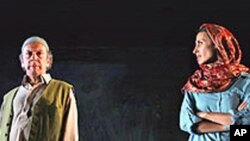British play about the history of Afghanistan begins its U.S. tour Wednesday in Washington. This political theater requires more than a bit of endurance.
It's described as an epic exploration of foreign engagement in one of the most complex cultures in the world. Sarah Frankland, the U.S. Arts Manager for the sponsoring British Council says the play can be described as epic as well.
"It's gonna take you nine hours to see the whole thing, first of all," she said. "Actually, there are breaks in there, so don't panic, you'll be absolutely fine. I absolutely encourage people to see the whole thing. You can see it over three nights, or you can see it all in one go starting in the morning and ending up in the evening. And you can have lunch and dinner in between and you've got great . And you've got great opportunities for conversations there about some of the themes and subjects and issues raised from the plays."
Director of London's Tricycle Theater Nicolas Kent is who conceived the production.
"Well, what I was trying to do with this project was not give something people could easily be dipping in and out from," he said. "I thought it was like reading a newspaper, reading a great article and finding it interesting and then saying I've read that, I'm putting it down. I really wanted people to think and stay with something. So I thought I'd construct a day, really, when people come in the morning, watch a number of plays about the coming of independence to Afghanistan, the first Anglo-Afghan War in 1842, and through to 1930. Then spend the afternoon with us looking what happened from the Russian invasion of Afghanistan, the army of the Mujahidin by the CIA, the coming of the Taliban. And then in the evening, look at what had happened after Operation Enduring Freedom and since the American and NATO involvement in Afghanistan. So throughout the day, they would spend the whole day wrestling with Afghanistan, thinking about Afghanistan, concentrating on it, beginning to understand the problems Afghan people were facing, the way the West had been in Afghanistan since 1842 and the way, and the way many of those problems were caused by us and the way be had to try and find some of the solutions to the problems we caused together with the Afghan people."
The 12 plays cover 150 years of Afghan history ranging from the 1840s until the present day.
The plays continue to evolve, being updated when current events dictate. But does the presentation view the story of Afghanistan solely through Western eyes?
"It's a message that's coming through the play as you just said through Western eyes, and it's one perspective," said the British Council's Sarah Frankland. "What is very powerful, I think, is that it is an historic contextualization, so it is delving into what has happened in the past that shows us the line on what's happening today."
The British Council will host a series of public discussions during the U.S. tour exploring ideas brought up in the Great Game. In addition to Washington, the tour will make stops in Minneapolis, San Francisco and New York on its U.S. tour.
Related video by Derek Henkle:




